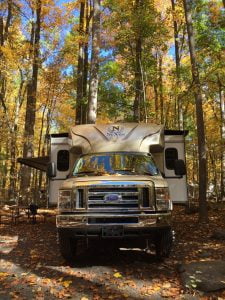
Dry Run, Boulder Woods Campground
HNF: Tell us about yourself? Favorite hobbies?
Rick:
I’m a 53 year-old single father to a daughter who recently started college. I was raised in a Jewish family living in Philadelphia, the youngest of three children, and currently live in Chester County, Pennsylvania. I joined the Navy after high school and worked with submarine-based nuclear weapons until the end of the Cold War. At that point, I decided I wanted to be in a helping profession. I was accepted into the Navy Medical Enlisted Commissioning Program and earned a B.S. in nursing. I entered the Navy Nurse Corps and held a number of positions, including charge nurse on a medical surgical unit, Shock Trauma Platoon leader, chairman of a hospital disaster preparedness committee, and supervisor of an orthopedic clinic where I started an outpatient surgical unit. I retired from the military after 20 years, my career cut short because of CMT. My work in the civilian sector began with a brief stint working in a psychiatric unit before going on to work for a large disability insurance company. Ironically, I left this job of almost 13 years on disability due to CMT. I enjoyed every aspect of my career and was sad to see my career come to an end.
Even though I cannot hold down a regular job, I want to help others in whatever way I can, especially those with CMT. I’m really looking forward to jumping in, spreading awareness of CMT and advocating for CMT patients. My hobbies include traveling, playing guitar (which I’m not very good at, but it’s a lot of fun), and photography – my passion. I’ve had to give up some of my past joys, like gardening and hiking because of CMT and my current hobbies are also limited by my condition, but I’m quite happy doing what I can.
HNF: When were you diagnosed with CMT? Briefly explain your journey getting diagnosed with CMT.
Rick:
I started showing signs of CMT in high school when I began to notice that my legs would become weak and tremulous with repetitive exercise or heavy exertion. Sometimes I experienced numbness and tingling in my legs, and pins and needles sensation in my hands. Midway through my Navy career, I was having trouble passing the running portion of the required physical readiness testing and in 1991, I was sent for a neurological workup.
Testing showed a “neuropathic process”, but it was felt that my findings were not consistent with CMT. As time went on, I was having more and more trouble running and eventually had problems walking. In 1997 I was sent to another neurologist and based on my exam and further testing, along with family history, I was diagnosed with CMT. Because of the impact CMT was having on my functioning, I was to be processed for discharge from the military. Fortunately, with full support of my department head and commanding officer, discharge was waived and I was allowed to continue working as a triage nurse (a sit-down job) until I could formally retire at 20 years. Since I left the Navy my work has mostly been at the computer, but
eventually I could no longer continue because of pain, fatigue and progression of symptoms in the hands. For years I have been part of a CMT study led by Dr. Scherer at Penn. Although past diagnostic studies included a nerve biopsy which showed damage to the covering of the nerves in my legs (demyelination), consistent with CMT Type 1, Dr. Scherer ordered genetic testing which revealed a defect involving the nerves themselves and thus I was diagnosed with CMT Type 2A.
HNF: Do other members of your family have CMT?
Rick:
Yes. Both of my sisters are completely “disabled” by CMT. My nephew and 2 of my cousins also have CMT, but they are affected to a lesser extent.
HNF: Why did you decide to embark on this journey?
Rick:
There are a few things that have led me to this decision. In April of this year I took a trip to Arizona to photograph the desert. I had reservations about going, wondering if I could do it alone. The trip profoundly changed my life. I met some truly amazing people, including a full time RVer. I was fascinated by the whole motion of the RV lifestyle, living as a minimalist and nomad, being able to pick up and go pretty much anywhere you want, when you want. Part of the draw for me was that I love to drive, which I did a lot of while out there. Driving is about the one thing I feel I can do as well as any other, more able-bodied, person. When I returned home, I couldn’t stop talking about my experiences, especially about RVing. My daughter (the realist) felt I was romanticizing things, which no doubt I was. After doing a lot of research I began to realize that perhaps this would not be the right thing for me, given my condition.
I went back and forth in my decision process, continuing to do more research. I even attended a three-day long RV “boot camp” (yes, anything military sounding and I’m on it) given by Escapees RV club so that I could learn more, including whether or not RVing was for me. What I discovered from the course and in talking to other students (many of whom were already full timing and getting a refresher) was that not only was it right for me, it made total sense!
Life in an RV, while not easy, isn’t as challenging as I had led myself to believe. Folks were telling me that people in the RV community are very supportive and eager to help. I was sold, my life was about to change. I made the leap and purchased my RV in early October and soon after went on a 5-day outing at Boulder Woods campground. I had learned a lot, but this was where the rubber hit the road, literally. I needed to get used to my new home on wheels and see what needed to be taken care of before I began life on the road. It was an amazing 5 days. I met some wonderful people and made a few new friends. Everyone was so helpful and seemed thrilled and welcoming when they learned I was a newbie to RVing.
I quickly began to appreciate how everything was so close at hand in my little home; much less space to traverse and clean than in a traditional home. And you can’t beat the convenience of living in something you can drive.
I had decided a while back I wanted to do some advocacy work for CMTers, and also help others with disabilities in regards to the RV life (interestingly, I found little on the Internet about the subject). One of my new friends at the campground talked with me about problems she was having with her legs and arms that to me seemed classic for CMT. She said she has neuropathy, but that her neurologist doesn’t know the cause. She said she was going to return to her neurologist or a different one to explore the possibility that she may have CMT. Regardless of the outcome of that, I could already see that I might be able to make a difference in helping others, and I haven’t even set out on my journey yet. Last, but not least as far as my decision to hit the road was a desire for further self discovery. I know I’m not the total sum of my parts, some of which aren’t working like they used to. I’ve been on a spiritual journey as of late and I think that will be deepened by my physical journey. Save for my fuel use, I will be living a very “green” lifestyle (RVing requires it) and this is very much in keeping with my spiritual beliefs.
HNF: What are the challenges you face with CMT and how will they impact your travels?
Rick:
Because of the loss of muscle (atrophy), I am very weak and unstable on my feet. Falls are not uncommon for me, though fortunately I haven’t sustained any major injury, yet. My hands and fingers are becoming weaker as well, making it a challenge to do things like button shirts and pick things up or even sometimes to write or type. There is also pain not only in my arms and legs, but my back as well from the awkward way I walk, along with sometimes profound fatigue. Pretty much everything I do is affected by my condition. Oh brother, what am I doing?! Well, at least I am able to drive, though as with any other activity I have to pace myself according to how I feel. A lot of planning has to (or should) take place before going into full time RV living. This is even more the case when you are going solo and have a disability. As I’ve mentioned, I don’t have to worry about walking about nearly as much in an RV as I do now in my apartment. When outside of my motorhome, I’ll do as I do now to get around, which is with the use of a cane and braces (ankle/foot orthotics) or a scooter for longer outings. The braces and scooter have been a game-changer for me. When driving, if I feel tired or in pain I’ll find a place to pull over for a while and lie down. I’ve learned the hard way that I need to take things slow, especially on my feet and when fatigued. Even more than I do now, I will need to allow my body to dictate my activity so that I remain safe and without injury.
Safety is a huge issue for RVers, but it is particularly important for me (it’s of big concern for my family and friends). Because my physical challenges are very obvious to others, I’ll need to be particularly mindful of my environment and even though it seems antithetical to the whole RV idea, I will have to keep a cell phone with me at all times. I purchased a few items that will help prevent injury and make things easier. I have a cane that doubles as a seat for use when dealing with plumbing and electrical connections and accessing storage compartments and I have a pair of rubberized work gloves to grip those connections. I picked up some flares and a flare gun as well as an air horn for use in the event of an emergency where I can’t otherwise get hold of someone. Probably the most important thing is to let someone back home know my whereabouts and check in before going into the backcountry.
What are you most excited about? What are you most concerned about?
Rick:
What I’m most excited about? Not an easy question to answer because there is some much to look forward to. I’m definitely looking forward to meeting new interesting people and I plan on capturing in picture and word the essence of those I meet whose stories really resonate and move me. I suppose I’m most concerned that when I get out there I’m going to realize that my dream turns out more of a nightmare. I’ve thought long and hard about what I’m doing, but I have no way of knowing how things will turn out until I’m out there.
HNF: How has CMT changed your life?
Rick:
At this point in my life, having CMT seems like a blessing. I’ve not only learned to accept my condition, but to embrace it. I don’t think I could have arrived at that level without the incredible support and inspiration I’ve had from others. Having CMT has enabled me to have an appreciation for the things that most, more able-bodied, people take for granted or don’t take notice of in their hurried lives. Through all the challenges and difficulties I have encountered I’ve learned a lot about myself, including the need to be more patient. By being persistent and having a positive, can-do attitude I’ve pushed the bounds of my limitations (sometimes a little too far). With this kind of approach to my having CMT, I’ve been able to live my life to the fullest.
HNF: What’s a favorite quote of that you think of often?
Rick:
“Who’d have thunk.”
HNF: What do you hope to get out of this journey?
Rick:
I hope to experience as much as possible along my journey the wonder and beauty, and the not so beautiful, that is America. It will be an inward journey, an opportunity for boundless personal and spiritual growth. It’s also my hope that people will want to follow me in my blog through parts of my journey and that in doing so they might feel inspired to follow their own dream within their own limitations. That they may see that even though we don’t have a choice in what we’re handed, with the right mindset we can still live a meaningful and joyful life.



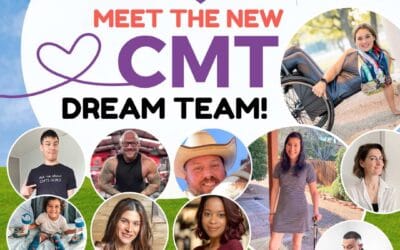

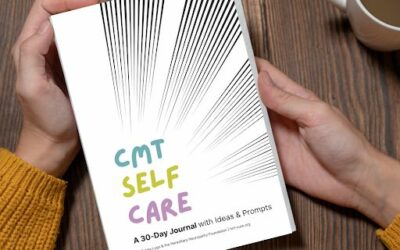
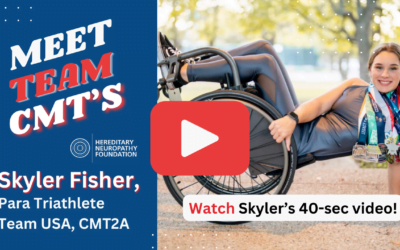
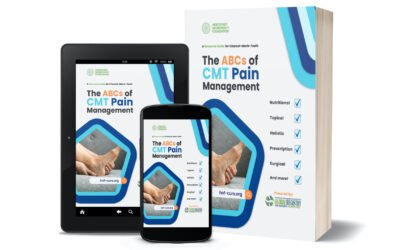
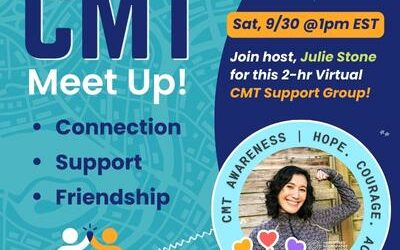


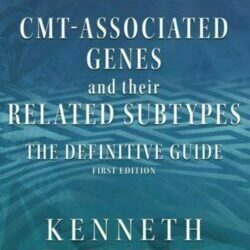

Rick, are you still traveling? I came across your blog and I’m interested in your journey with CMT.
Rick is a wonderful, inspirational and fun person. This all comes out in the article but even more so in person if you’re lucky enough, as I am, to know him.
Ed, I really appreciate and I am humbled by what you said. I am happy that the number of people feel inspired by what I’m doing. Probably the single most important thing I can do for others especially those with CMT is be a source of inspiration. I’ve had the good fortune of being inspired by others suffering more so than I as well as having great support. One hand washes the other.
Rick
You are an amazing human being. Your drive and perseverance never cease to amaze me. I am happy that you have found a way to continue to do the things you love, including helping others. May God be with you and keep you safe in your travels.
Thank you Susan. I need to feel a sense of purpose and this is ideal. Forging many connections with folks who have CMT or know others who do. So much incredible support. I’m going to try and get into Chattanooga later this week to get together with Ali and the other CC’s, depending on road conditions and how I’m doing (fingers crossed).
Rick,
I am excited to follow you on your adventure. I have CMT also and recently moved from Pittsburgh to Murrells Inlet SC after going on disability. Just bought a used popup camper to do some traveling myself
Wish you happy travels!
Tracy
Hi Tracy. Thank you! Id like to learn more of your situation, and your travels. Thats exciting!
My son was diognosed with Cmt at the age of 15 . He is now 30 married with two very young children . Although his legs have become very thin and weak he still walks , drives and work.
We can not recall any member of our family having Cmt. We are touched by your story and we pray and hope a treatment would be found
Thank you for sharing that. The thinning of the legs and weakness can be helped some with routine exercise. Especially if started early. I realize it can be hard to find time with a young growing family. Im curious to know more. I wonder if your son would be willing to share his thoughts and experiences.
I am very humbled and touched by your story. Thank you for having the courage to share it. My dear daughter-in law, her Mom and our sweet granddaughter have CMT and we need to know that people like you perservere through this disease.
Thank you. Seems all we cam do is our best. Someday there will be a cure. I hope your family stay connected as you do and I certainly wish them well.